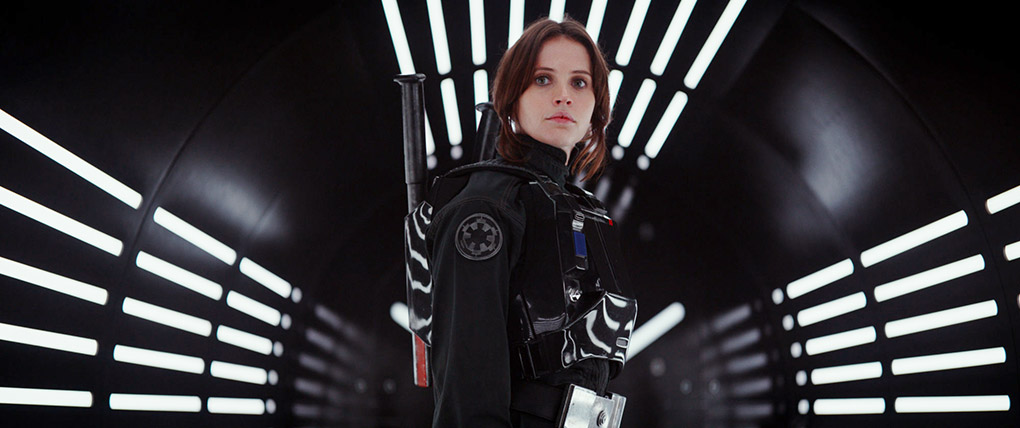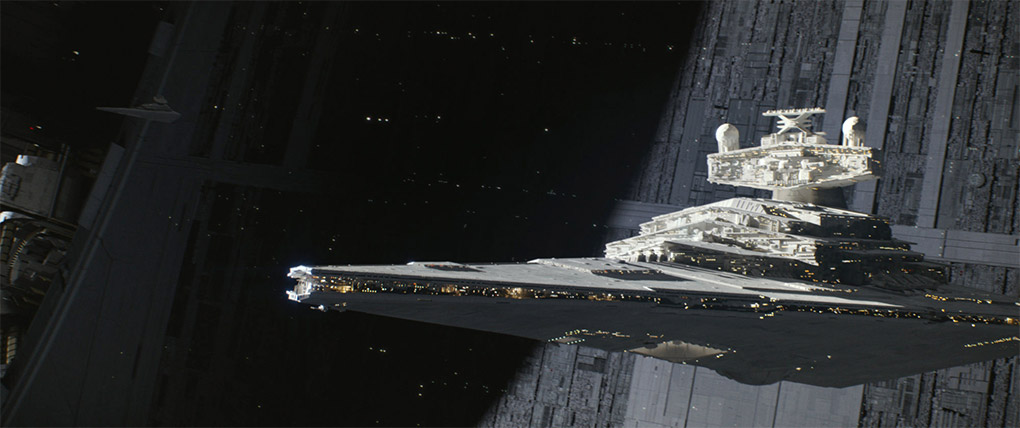| |
"When you make a CG-heavy movie, something so fantastical has to have a lot of CG, that planning and that contrivance can often make it feel fake and not as real as other movies. And so I was desperate on this one to make it as authentic as we could and have the audience really believe this was a real city or town and that this must really be unfolding because I don't quite understand how they've done this." |
| |
Director Gareth Edwards* |
There are many wonderful things in Gareth Edward's own take on Lucas' galaxy far, far away. For a once digital effects artist, Edward's clearly got high standards (Godzilla was a terrific example of a great mainstream FX pic) and Rogue's effects work is dependably seamless and assured. There is a huge caveat to this, which I'll leave for my final paragraph as it dips its toe in spoiler territory – that said, the information is already available on the Wikipedia entry on the film. For the die hard or casual fan, this is a true, almost up to the minute prequel in the sense that the original Star Wars takes place the moment after Rogue One ends. Its action is first class, the story careens along at a breakneck pace and a fan's familiarity with small details gives the whole thing a profound shiver of nostalgia. Composer Michael Giacchino eerily channels his inner John Williams (the score is a beautifully faithful facsimile of the 70s' composer's work) and the whole tone of the piece is gritty, urgent and we know there will be prices to be paid. You're getting the strong sense that there's a "...and yet," coming very soon, right? And yet... why did I not care one iota what happens and to whom? I'm going to blame someone who always should be looked at first as the obvious culprit, myself.
I am of the classic Star Wars generation. I queued for four hours to see it first in January 1978 and I was 16 years old, old enough to get most adult references but still young enough to revel and bask in the sheer fun of the movie. I will always remember my friend's first remark on exiting the cinema... "They ought to show that film on the National Health!" I am as flawed as the next person – conceivably more so – and I certainly seem to flying in the face of a widespread approval for Rogue One. I will accept that my expectations for a satisfying film experience may be dated, even carbon dated (thank you Joss). So if Rogue One is thrilling audiences, I'm happy both for the movie and the audiences. Another great friend of mine described his Rogue One exposure (after experiencing it in every modern tech manifestation it could be screened in) to be akin to a theme park ride. I have never found those in the slightest way emotionally engaging with the exception of wild fear for a split second. The original 1977 movie was an enormously defining experience. It was sheer and unapologetic fun, colourful, funny and overwhelmingly exciting. To me, Rogue One has very little fun. Fair enough, as it's almost a war film in the way a movie called Star Wars never was. Three quarters of it felt like it was shot underground with ideally just one more light required but never sparked into life. It's murky and very grey and brown and I almost cheered when a battle started in glorious blue-skied sunlight. At the beginning, it leaps from planet to planet and while its location and character set-ups are necessary, there's a strong sense of (ironically) vagueness in the narrative. Do you know the best example of precise narrative, a story with a through line like a steel girder? It's called Star Wars. Five minutes in and you know what's at stake, who wants what and how difficult it's going to be to succeed. In Rogue, we know there's a point to all this planet-hopping but by the time the crew is assembled, I felt like we'd been all over the place resulting in very little narrative satisfaction. Some of the planet names also seemed a little oddly chosen, Jedha, anyone? My immediate thought was Saudi Arabia, not the Knights...

The story rather cleverly reinforces and supports the original movie's logic hole of having the X-Wings aim at a literal hole to fire into, an act that would create a chain reaction and destroy the Death Star. A cover, as some wag has suggested, would have been a good idea. It seems that this oversight on behalf of the original designers was – in Rogue One's universe – a deliberate act of sabotage. Mads Mikkelsen plays, essentially, Albert Einstein, a man who has the knowledge and ability to fashion a destructive weapon so powerful that it could destroy planets. OK, Albert wasn't working on a planetary scale but the H-Bomb was bad enough. Mikkelsen plays the prime mover Galen Erso, living a simple life seemingly alone on his own planet with his wife and daughter trying to resist the advances of the Empire that needs him to complete the Death Star. He gives in after personal tragedy and losing touch with his beloved daughter. The daughter grows up to become a worker slave for the Empire and after a rebel rescue mission, she's pulled in to the cause. So her own mission is to find her father and get the plans to the Death Star that Galen has sabotaged by creating its weakness. But the rebellion is not as keen as she is to take those manifold risks.
Felicity Jones, playing Jyn Erso, is a fine actress. She was absolutely brilliant in A Theory of Everything, utterly convincing and sympathetic not to mention moving. In Rogue One, she seems half formed as if she's not quite sure what her own backstory is. She ticks many boxes on the Hollywood checklist (she performs action scenes really fluidly and looks terrific while she's doing them) but there's no feeling of deep commitment behind her eyes. Now this is due in part to my own perhaps faulty perception but I imagine the script may have contributed. The dialogue seems on the nose and mechanical. OK, Lucas' flair for dialogue was never a strong suit but that's really not something to be rabidly emulated. The comedy robot (Firefly's pilot, Wash, Alan Tudyk) is quite unfunny and even when he may be slightly amusing you can feel the scriptwriting gears moving behind the smart arsery. There's a strong sense of the robot being another ticked box and even though being an ex-Empire robot is important to the plot, he's so dull to look at and Tudyk as a creative performer doesn't seem to be allowed to let rip. The supporting cast never press their collective hands into the cement of the narrative enough to make an emotional impression. The trust of the band of rebels seemed to have formed because of a character's mind reading ability together with the fact that they were all thrown into the same prison. The diktats of cohesion seem almost arbitrary. Jyn's speech to convince a great number of people to basically be stormtrooper laser fodder is not exactly Shakespearean and why the rebels she does scrape together trust her with their own lives is utterly inexplicable.

There are literal shot lifts from the original trilogy (presumably the pilots that took on the Death Star were active in the rebellion on this earlier mission to secure the plans) so this makes perfect sense. There are also a few lifts of the shots of the Death Star being fired by technicians. This is all fine and in its own way rather cute but where Rogue really missteps in my narrow yet humble opinion is trusting the tech to do what it is still incapable of doing. So, yes, this is the intro to the paragraph that you need to avoid but I say again, this information is available on Wikipedia and it is not a specific plot or narrative spoiler in any way. So in conclusion before the final paragraph, Gareth Edwards has made an exciting and rousing movie ticking a lot of Star Wars' boxes but from my perspective, without the heart and charm of the original but as I said, this may just be me. You only get one or two special Star Wars experiences in a lifetime and maybe I've hit my quota ceiling. Go, have fun but be aware, folks of my age looking for that profound movie going experience, it may not be the movie you are looking for...
So, in stitching together a modern film to be a prequel to a move shot almost forty years ago, you may want to fold in some elements of that previous film. Production design, no problem, props, no problem. Darth Vader, no problem at all. David Prowse, the original physical Vader, maybe not. He earned the wrath of Lucasfilm™ aligning himself too enthusiastically to his portrayal of the original bad guy and now has fallen foul of the corporate machine. Other actors? Well, what if one has actually aged forty years (it happens, especially after forty years) and even worse, what if one's actually dead? Hey, we have computer generated imagery, we can do anything! Uh, no. The CG Peter Cushing is startling but it's still obviously a CG Peter Cushing so rather than have his performance affect the film and drive the narrative, I just sat there thinking "That's enormously clever but not one whit convincing as a live human being." After Princess Leia is referenced, I feared I was going to be treated to a CG Carrie Fisher... Yup, and as good as the CG is, it's still a patently fake Princess Leia. The fact that she delivers the final line underlines what a creative faux pas this was (in my opinion). Not sure what I would have done given the choice but definitely not rely on CG. Couldn't they have gone back to the original Star Wars negative out-takes for Fisher's cameo? OK, they wrote a part for the Cushing character so had to have some control over his performance but surely Carrie fluffed some takes we've never seen before in 1976/7. Any line with a plosive 'p' could be dubbed with the word 'hope' and we'd be none the wiser... Ah, well. I'm assuming the filmmakers looked into all this. Yes? No?
*http://www.slashfilm.com/star-wars-rogue-one-gareth-edwards-interview/
|